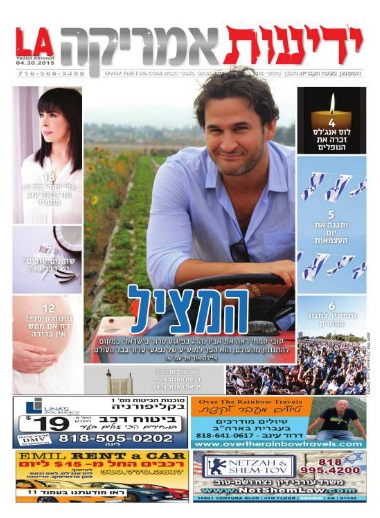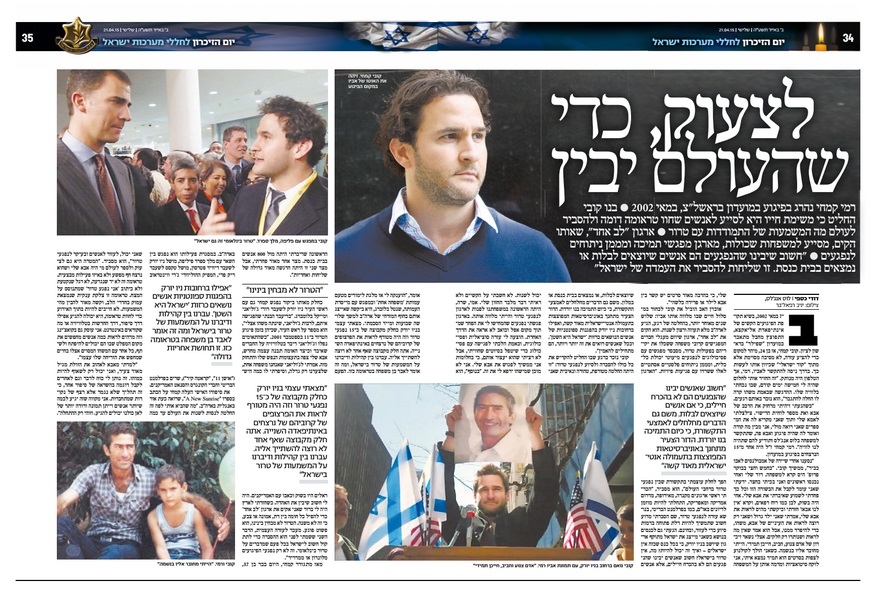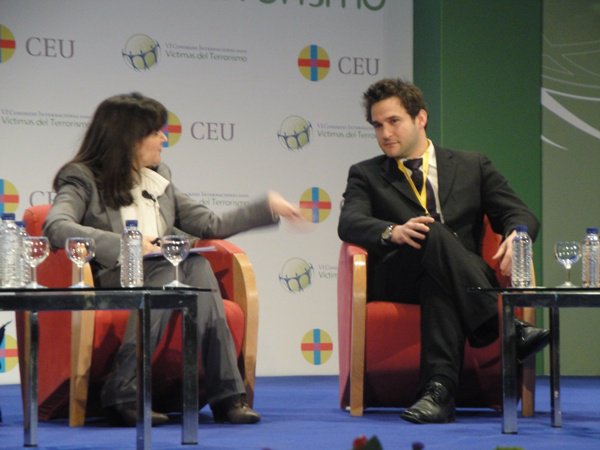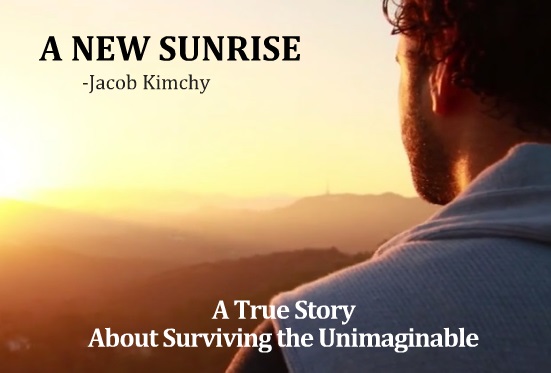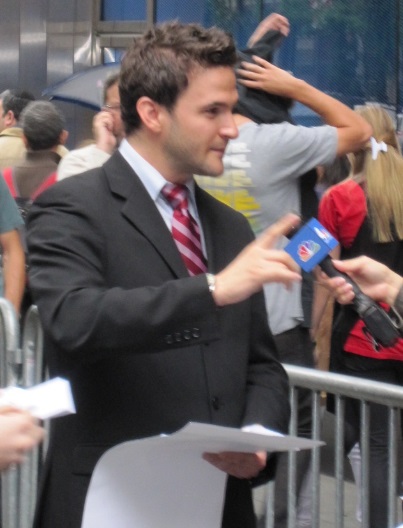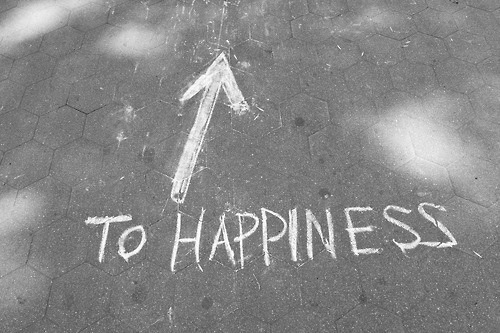Tag: One Heart
israelhayom.com: Jacob Kimchy- Calling out for the world to understand (Interview)
Rami Kimchy was killed in a terrorist attack in 2002 • His son Jacob made it his life’s mission to help other victims of terrorism and to explain to the world what it means to deal with trauma • The organization he founded — Lev Echad — does just that.
Hebrew version: http://www.israelhayom.co.il/article/275889
English version: http://www.israelhayom.com/site/newsletter_article.php?id=25175
shalomlife.com (Interview): One Man’s Journey from Trauma & Terrorism to Meaning & Purpose
On May 7th, 2002, Jacob Kimchy’s entire life changed. The Rishon Lezion native was out for a late-night dinner with a friend when he received a call informing him of a terror attack that took place at The Sheffield Club, a popular spot in his hometown.
Rushing to the venue so he could help the survivors, he bore witness to the horrific scene inside before noticing a taxi cab parked outside.
It was his father’s.
The next few years would be somber for the Kimchy family, and equally so for Jacob, filled with grief and suffering over the injustice that occurred, and over the loss of his father. Somehow, he eventually found a new light, and sought out help. Jacob discovered that his experience with trauma – his story – could help others who’ve suffered from trauma, others who’ve lost friends and loved ones to terrorism. He moved to the U.S., and co-started a foundation, One Heart, helping victims of terrorism around the world. He also recalled his experiences during his position as a motivational speaker, and helped victims dealing with grief as a life coach.
algemeiner.com: How an Israeli Hero is Helping Victims of Terror Begin Life Anew
Since September 2000, Israeli society has been subjected to numerous deadly terror attacks. Since then, several studies have examined the stress-related mental health symptoms and coping behaviors of surviving family members of these barbaric acts.
Indeed, research has revealed that people who experienced an attack directly showed elevated levels of distress, lowered sense of security, and pathological reactions such as post-traumatic stress disorder (PTSD) and depression.
Despite the psychological and emotional damage wrought by direct exposure to an act of terrorism, people such as Jacob Kimchy have channeled their unimaginable sorrow into the cause of a lifetime.
In 2002, Jacob’s father Rami Kimchy entered a nightclub in his hometown of Rishon Letzion to pick up a client. Rami was a dedicated family man and hardworking taxi driver. A few minutes after Rami had walked into the club, an 18-year-old Hamas suicide bomber entered it and blew himself up, killing Rami and 14 others instantly.
You can learn more about Jacob Kimchy’s motivation behind writing ‘A New Sunrise’ in this short YouTube clip.
Algemeiner.com: On Israel’s Memorial Day, One Man’s Quest to Channel the Trauma of Terror Victims Into Something Positive
In 2002, Jacob Kimchy’s father died in a Hamas suicide bombing in his hometown of Rishon LeZion. Thirteen years later Kimchy is still struggling with the loss, including nightmares that have him screaming in middle of the night.
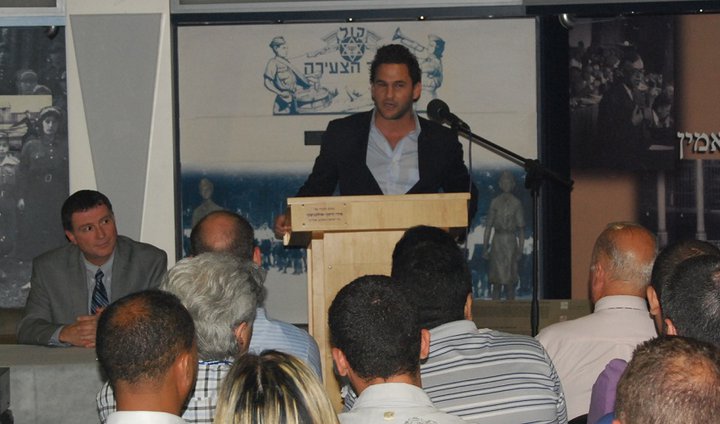
Nevertheless, he has embarked on a journey to help other terror victims overcome their traumas as Israel on Wednesday marks Yom Hazikaron, the national day of remembrance for fallen soldiers and victims of terrorism.
“I met victims of trauma that would not share anything,” said Kimchy. The pain builds up inside the victims, “it’s like a poison. It kills you and eats you slowly. The other way is to open your heart, to open your mouth, to express and to share, and to do.”
unitedwithisrael.org: Jacob Kimchy’s Journey From Terror Victim to Motivational Speaker
Contending with his own deep loss, the son of a terror victim finds new meaning in life by helping others deal with their grief.
Nearly 13 years ago, a Ukrainian woman and her Palestinian husband drove a suicide bomber to Rishon Lezion, a city in central Israel.
The suicide bomber entered a game club on the night of May 7, 2002, located on the third floor of a building, and detonated a suitcase full of explosives, complete with shrapnel and nails. Patrons at the club had been playing card games, slot machines and snooker as the explosion went off, causing part of the building to collapse.
unitedwithisrael.org: From Terror Victim to Warrior: Jacob Kimchy’s Story
An Israeli man stricken by terror has made it his life mission to help victims and their families. It is a story of triumph over the darkest forces of evil.
As the terrible attacks of 9/11 are remembered and mourned, we selected to focus on the story of one terror victim from Israel who, by continuing a legacy of mutual support and giving, chose not to succumb to terror.
Jacob remembers the fateful phone call vividly. “Where are you!” screamed a friend who worked for Israeli Intelligence. “There’s been a terrorist attack! Where are you?” I immediately called my father. But there was no answer. I went straight to the scene of the bombing.”In 2002, Rami Kimchy, 57, a taxi driver, entered a club in his hometown of Rishon Letzion, near Tel Aviv, to pick up a client. Within minutes, an 18-year-old Hamas suicide bomber entered after him and blew himself up, killing Rami and 14 others instantly. His son, Jacob, was one of the first to arrive at the scene, in hopes of helping survivors, only to recognize his father’s car parked in front and to quickly realize the dreadful fact that his father had been murdered.
Overcoming Loss and Tragedy
“For many months after the murder, I could find no way forward. What was this life? What kind of a God would allow something like this to happen to a kind, sweet man who had never hurt anyone? I was lost. I found myself driving at night as fast as I could, up to 100 miles per hour at times, music blaring, screaming and crying.”
Jacob was sure he would never be able to overcome the loss and tragedy. But he did. After attending a support group for young people who had lost their parents, at the request of his mother, Jacob found his path.
Despite the psychological and emotional damage wrought by direct exposure to an act of terrorism, Jacob channeled his unimaginable sorrow into the cause of a lifetime. After many months of indescribable agony, he slowly came to the realization that one way to carry on living with such unimaginable pain is by reaching out to other victims of terror. In time, this coping mechanism would flower into a mission.
thejewishweek.com: Happy Campers, Unhappy Memories
Evyatar, a kindergarten student in Israel 13 years ago, sensed that something was wrong when neither of his parents picked him up from school. An uncle showed up a few hours later and told his nephew what had happened – Evyatar’s parents had been attacked by terrorists at an Israeli toy store; his father was dead, his mother injured. Ben Borgia, a voice-over actor in Australia, heard his tragic family news at 7 a.m., Sydney time, seven years ago.
His phone rang. His mother and 13-year-old sister, he learned, were among 202 people killed, 88 of them Australians, in a terrorist bombing the previous night in an Indonesian nightclub. Bali that day became Australia’s 9/11. For two recent weeks, Evyatar, a 19-year-old Jew, and Borgia, a 29-year-old Catholic, and several other young Jews and Christians, shared their common experiences as victims and survivors of terrorism.
At a weeklong camp sponsored by the One Heart Global organization (oneheartglobal.org) at Bryn Mawr College near Philadelphia, and during a subsequent week of touring here, they shared their stories of loss, comforted each other, laughed and cried together, and talked about common interests in music and sports. “People” who have escaped a terrorist attack or lost a family member to terrorism “don’t get to share their stories very much” with others who have gone through the same experience, says Evyatar, a recent high school graduate who asked that his full name not be printed. For him and the other participants in the One Heart Global activities – including teens from Spain, Liberia, the United States and Northern Ireland – the camp’s therapy sessions and conflict resolution lessons, leadership training classes and entertainment downtime, were a rare chance to unburden themselves or simply keep their feelings to themselves with peers who understand either choice.
The camp was co-sponsored by Tuesday’s Children (tuesdayschildren.org), a family service organization founded by family and friends of 9-11 victims. “It helps. It helps a lot,” Evyatar says. He and Borgia, who is working on an oral history project with other victims of terrorism, discussed the discomfort they feel, or which friends feel, when the subject of parents come up. “When people talk about their mothers, it’s a very difficult experience,” Borgia says. He feels his loss especially at those times. He and Evyatar discussed how they coped with losing a parent, suddenly, to terrorism. Evyatar, then still a kid, would keep his emotions inside. Borgia says he took up drinking. “For a long time I had to escape.” And they talked about the ongoing impact of terrorism on other members of their families. Borgia says he joined the One Heart Global group as part of his mission to help fellow victims of terrorism, particularly needed in a country like Australia that does not offer the network of support services for victims of terrorism available in this country and Israel.
“I’m trying to find my purpose,” he says. The organization includes the training and conflict resolution sessions in its annual camp in order “to promote the idea of global peace” among the people most affected by hatred, says Sarri Singer, co-founder of One Heart Global. “This is the next generation. These are the next leaders of their countries.” Singer, a native of New Jersey and assistant director of career services at Touro College, was injured in a terrorist bus bombing in Jerusalem six years ago. The blast killed 17 people, including everyone around her on the bus, and injured 100 more; she spent more than a week in the hospital. She and Jacob Kimchy, a Sabra whose father was killed in a terrorist attack in Rishon Lezion seven years ago, established One Heart Global to help other victims of terrorism heal.
The organization’s motto is “Healing victims of terror and their families around the world.” “Terrorism does not discriminate,” Singer says. “It’s not just one country’s problem. It’s not just Israel’s problem.” The pain of losing a parent is “always there – it’s a scar for life,” even if it is not always discussed, says Kimchy, who helped found One Heart Global as a memorial to his father, Rami. In New York, Kimchy and Singer and the participants in this summer’s activities told their stories, some hesitantly, some more confidently, during meetings with Israel Consul General Asaf Shariv and Gov. David Paterson. The governor, who talked about government efforts to assist workers who became ill after working at the World Trade Center terrorism site, said he was inspired by young people who had lost relatives to terrorism but are working to help other people. “I’m afraid [you] would have become jaded,” he said.
“There is a fight you can wage with a spirit.” The group’s itinerary here included shopping and sightseeing, and meetings with other politicians and One Heart Global donors. The subject of each person’s loss to terrorism came up during the two weeks, but not all the time, Evyatar says. “My whole life is not about that.”
Via http://www.thejewishweek.com/features/happy_campers_unhappy_memories_1
nysun.com: WTC Survivors To Meet With One Heart, Group for Terror Victims
After the terrorist arracks of September 11, 2001, New Yorkers tapped into the vast reservoir of experience to terrorism that Israelis possess.
The experience-sharing will continue – and flow both ways – at a meeting on June 26 between the World Trade Center Survivors’ Network and One Heart, a two-month old organization that hopes to provide survivors of terrorist attacks who may have psychological trauma with emotional support. Although not limited to victims of terror in Israel, all of its initial members fit that bill.
“One of our goals is to use our experience to help other survivors,” said Richard Zimbler, an organizer for the World Trade Center Survivors’ Network, which has 750 members. “When we first started out, the survivors of the Oklahoma City bombing gave us advice,” he said, and now September 11 victims are passing it along to others.
One of the two founders of One Heart, Jacob Kimchy, said, “It’s important to bring survivors from different places to one table, to one forum.”
The main purpose of One Heart is to make both group and individual psychological therapy available to survivors of terrorism who may be experiencing long-term trauma, and for relatives of those who have been killed. “Usually people who want to help focus only on immediate needs,” said the other founder of the organization, Sarri Singer. “Nobody thinks into the future.”
Another area of support is providing survivors with the resources to receive plastic surgery for deformities stemming from their attacks-an area that Ms. Singer said directly relates back to psychological trauma-.
In addition to the meeting with the World Trade Center Survivors’ Network, organizers of One Heart hope to have monthly meetings. A first meeting two weeks ago drew 15 to 20 people.
“There’s something about finding people who had the same experience as you that’s therapeutic,” said Barbara Chasen, a Ph.D. psychoanalyst who voluntarily led the first meeting and hopes to lead a few more. “In the talking there’s a bonding experience,” said Ms. Chasen.
Ms. Chasen offered testimony that sharing personal experiences could be therapeutic. She was stuck in an airport when the February blizzard hit New York City. She had overheard a man talking with an accent and asked him if he was Israeli. Mr. Kimchy responded that he was. They started talking about the latest terrorist attack in Israel, and Mr. Kimchy responded that he was in America to begin One Heart, and he said that he had lost his father in an attack. She soon told him that she had lost her 12-year-old son 13 years earlier after he was hit by a car.
“He took out a picture of his father, and I took out a picture of my son,” she said. “There we were two stranger sharing our deepest pains.”
Via http://www.nysun.com/new-york/wtc-survivors-to-meet-with-one-heart-group/34176/
